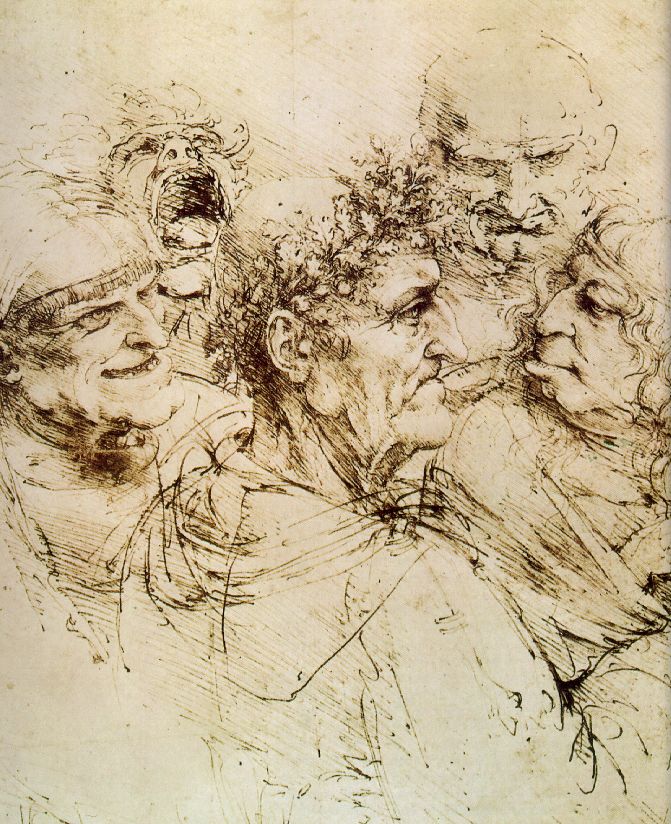The key to success is to be well surrounded, as they apparently invoke in the higher spheres of finance, business and politics. Spirit and law. Like art and aesthetics? Durer’s Christ and the Doctor’s shows Jesus surrounded by dogma and conservatism, even the lecherous, perverse and criminal. The individual’s enforced containment within three dimensions and the persecution of spirit as a manifestation of neuroses.

---The index finger of his left hand touching the thumb of his right, the young Jesus sadly debates a mob of arrogant, self-righteous scholars. The mood is ominous. The doctors are challenging him, thrusting their sacrosanct doctrines at the fresh pure voice of the youth. They are so cemented into dogma that Jesus's moral and ethical message is an affront to their hard-held authority. Citing their previous books as "gospel," they have completely ignored his message--that one must live by the spirit, rather than the letter of the law. Read More:http://litmed.med.nyu.edu/Annotation?action=view&annid=10311
The painting does remind me of Kafka’s Before the Law, as an allegory of Jesus defying convention, and “speaking truth to power” so to speak. The three principal figures in Durer’s painting could be the three gatekeepers in Kafka’s story. Does the parable lead us to a reflection on whether it is better to burn out in a flame of glory or fade quietly away in the ether suffocated by desperation, as was often a theme in Kafka, that of breathing ….
BEFORE THE LAW stands a doorkeeper. To this door-keeper there comes a man from the country and prays for admittance to the Law. But the doorkeeper says that he cannot grant admittance at the moment. The man thinks it over and then asks if he will be allowed in later. “It is possible,” says the doorkeeper, “but not at the moment.” Since the gate stands open, as usual, and the doorkeeper steps to one side, the man stoops to peer through the gateway into the interior. Observing that, the doorkeeper laughs and says: “If you are so drawn to it, just try to go in despite my veto. But take note: I am powerful. And I am only the least of the door-keepers. From hall to hall there is one doorkeeper after another, each more powerful than the last. The third doorkeeper is already so terrible that even I cannot bear to look at him.” These are difficulties the man from the country has not expected; the Law, he thinks, should surely be accessible at all times and to everyone, but as he now takes a closer look at the doorkeeper in his fur coat, with his big sharp nose and long, thin, black Tar-tar beard, he decides that it is better to wait until he gets permission to enter. The doorkeeper gives him a stool and lets him sit down at one side of the door….

Davinci. Five Grotesque Heads. Read More:http://naturesnotaskindasbooks.blogspot.com/2011/02/hieronymus-bosch-christ-carrying-cross.html
Kafka and Durer are exploring the sense of limits of the law, and also in a subtle way the the ancient crime of blood libel; the peculiar way the law as gatekeeper, opens and gives way to an even greater lawlessness it can’t contain or no longer wishes to control as Walter Benjamin asserted in his Critique of Violence which then circularized the argument back to messianism and nihilism, which effectively is the story of Jesus and the near pathological impatience of religious jews and their wails and whimpers of “we want moschiach now!”.
…There he sits for days and years. He makes many at-tempts to be admitted, and wearies the doorkeeper by his importunity. … During these many years the man fixes his at-tention almost continuously on the doorkeeper. He for- gets the other doorkeepers, and this first one seems to him the sole obstacle preventing access to the Law. He curses his bad luck, in his early years boldly and loudly, later, as he grows old, he only grumbles to himself. He becomes childish, and since in his yearlong contempla-tion of the doorkeeper he has come to know even the fleas in his fur collar, he begs the fleas as well to help him and to change the doorkeeper’s mind. At length his eyesight begins to fail, and he does not know whether the world is really darker or whether his eyes are only deceiving him. Yet in his darkness he is now aware t of a radiance that streams inextinguishably from the gateway of the Law. Now he has not very long to live. Before he dies, all his experiences in these long years gather themselves in his head to one point, a ques-tion he has not yet asked the doorkeeper. He waves him nearer, since he can no longer raise his stiffening body. The doorkeeper has to bend low towards him, for the difference in height between them has altered much to the man’s disadvantage. “What do you want to know now?” asks the doorkeeper; “you are insati-able.” “Everyone strives to reach the Law,” says the man, “so how does it happen that for all these many years no one but myself has ever begged for admit-tance?” The doorkeeper recognizes that the man has reached his end, and to let his failing senses catch the words roars in his ear: “No one else could ever be admitted here, since this gate was made only for you. I am now going to shut it.” Read More:http://www.herzogbr.net/kafka/beforethelaw.htm
———————–
According to a Hasidic belief, the Messiah would come if every Jew in the world once observed the same Sabbath correctly. Conversely, the Hasids also hold that if a Sabbath comes on which no Jew observes, then the Messiah will have to come. If the world isn’t good enough yet, perhaps it isn’t bad enough either. Or we may believe with Franz Kafka, who wrote, “The Messiah will come only when he is no longer necessary.” Read More:http://www.religion-online.org/showarticle.asp?title=1358








 COMMENTS
COMMENTS



